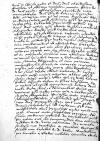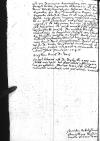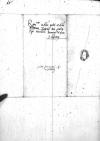Reverendissime in Christo Pater et Domine, domine colendissime.
Faustum et felicem ineuntum annum hunc Reverendissimae Dominationi Vestrae precor, officiosissima servitute mea commendata.
Domino ⌊Gurski⌋ litteras legendas dedi. Cui visum non est, ut coram ⌊reginali maiestate⌋ producerentur, quod futurum esset, ut gravius irritaretur.
Calendis Ianuariis audivi ex ⌊reverendissimo domino⌋ actum esse iterum de salvo conductu ⌊Alexandro⌋ dando, quod cardinales eum absolutum esse scriberent. Ceterum ostendit mihi postea ⌊Conarski⌋ litteras ad se scriptas a domino ⌊Locka⌋, in quibus haec verba reperi: “⌊Alexandrum⌋ iure convicimus et ad abiurandam haeresim compulimus. ⌊Qui⌋ cum aliis haereticis, quorum numero praeter eum sex fuere, haeresim publice et in conspectu omnium cum abiurare deberet, evanuit. Quaeritur tamen a lictoribus indies cum summa diligentia et cum primum comprehensus fuerit, in carceres coniectus, nescio cui infinitae poenae adiudicabitur”. Haec sunt verba ⌊illius⌋. Ceterum dominus ⌊Caspar⌋ neque mihi, neque cuiquam alteri, quod sciam, scripsit, neque ullas ipse ex ⌊urbe⌋ litteras habui. Exspecto autem in horas Liassotam. Ex eo certius aliquid cognoscemus. Litterae domini ⌊Locka⌋ datae sunt 16 Novembris, quas ego veriores esse credo, quam quae a cardinalibus scriptae finguntur. Quorsum enim petunt salvum conductum, si absolutus est? Itaque iam domino ⌊praeposito⌋ spero opus non erit.
Denuo scriptum est ad ⌊caesarem⌋, sed iam auctoritate serenissimi principis nostri opus non erit. Omnes enim supplices errorem sibi suum condonari petunt.
De ⌊Constellato⌋ quid hic actum erit, suo tempore, Deo bene iuvante, reddam Reverendissimam Dominationem Vestram certiorem. De moneta fortasse non tacebitur in comitiis. Quicquid fuerit, non latebit Reverendissimam Dominationem Vestram. Mandatum pro ⌊Cornelio a Staden⌋ mittitur. Comitia edicta esse pro Dominica Reminiscere iam cognovit procul dubio. Exempla litterarum ad reverendissimum dominum Vladislaviensem dederam reverendissimo domino legenda, qui domino cancellario regni ead[em] legenda obtulit. Iam is ad me scribere desiit. Cum Fricio magna mihi fuit conte[ntio] de eo, quod scripserat ecclesiam errasse. Q[ui] negat se id tamquam verum scripsisse, sed tanquam id, quod concedi sibi petere[t], disputandi causa. De mittendis ad concilium in comitiis fortasse consultabi[tur]. Ex Prussia missos iri puto. Quae sunt i[n] litteris Gedanensium et virginum perscr[ipta], cum reverendissimo domino communicavi.
Deum prec[or], ut Reverendissimam Dominationem Vestram quam diutissime servet incolumem et felicem. Cuius me gratiae commendo.


